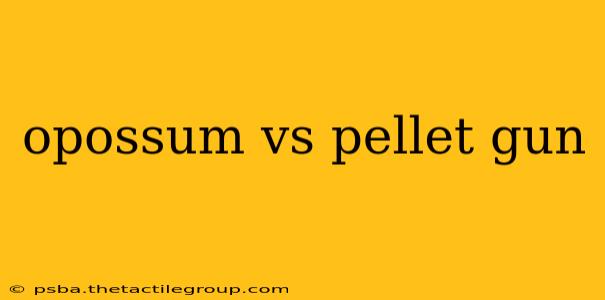The question of "opossum vs. pellet gun" sparks immediate ethical and legal concerns. While pellet guns might seem like a quick solution to perceived opossum problems, using one against these animals is almost always ill-advised and potentially illegal. This article delves into the complexities of this situation, exploring humane alternatives and the legal consequences of harming or killing opossums.
Why Pellet Guns Are Not the Answer
Using a pellet gun on an opossum is rarely a humane or effective solution. Opossums are surprisingly resilient creatures, and a pellet gun may only injure, rather than kill, causing prolonged suffering. The animal might escape, only to die later from its injuries or become a threat due to pain and disorientation.
Ethical Considerations
The ethical implications are significant. Opossums play a vital role in the ecosystem, controlling insect populations and contributing to soil health. Unnecessary killing disrupts this balance and is ethically questionable. Moreover, inflicting pain and suffering on any animal is inherently cruel unless absolutely necessary for self-defense or preventing significant harm.
Legal Ramifications
The legality of using a pellet gun on an opossum varies depending on location. Many jurisdictions have laws protecting wildlife, and harming or killing an opossum without a valid permit or in self-defense could result in hefty fines or even jail time. Before taking any action, research your local animal control regulations and wildlife laws meticulously.
Humane and Effective Alternatives
Instead of resorting to violence, consider these humane and effective alternatives to deal with opossums on your property:
Deterrents:
- Removing attractants: Opossums are drawn to food and shelter. Secure trash cans tightly, clean up spilled food immediately, and eliminate potential nesting sites like woodpiles or overgrown vegetation.
- Bright lights: Opossums are nocturnal creatures. Motion-activated lights can deter them from entering your yard.
- Noisemakers: Loud noises, like banging pots or using ultrasonic devices (though their effectiveness is debated), may frighten them away.
- Fencing: Proper fencing can prevent opossums from accessing areas you wish to protect.
Relocation:
If you've tried deterrents and still have an opossum problem, contacting wildlife removal professionals is advisable. These professionals are trained to safely and humanely capture and relocate opossums to suitable habitats.
When Self-Defense is Justified
In rare instances, using lethal force may be justifiable for self-defense. If an opossum poses an immediate threat to your safety or the safety of others, you may be legally permitted to take action. However, even in self-defense situations, lethal force should only be used as a last resort and the incident should be reported to the proper authorities immediately.
Conclusion: Choose Compassion and Responsibility
Dealing with opossums requires a compassionate and responsible approach. Using a pellet gun should be the absolute last resort, and only considered in extremely rare situations where an immediate threat to safety is present. Prioritize humane deterrents and relocation strategies to ensure the well-being of the opossum and your compliance with local laws. Always consult with wildlife professionals and local authorities before taking any action.

